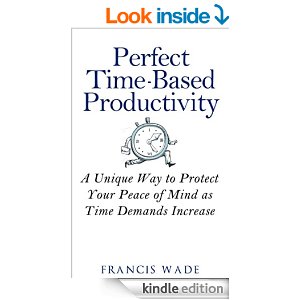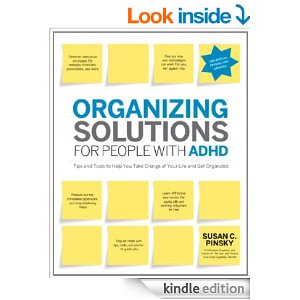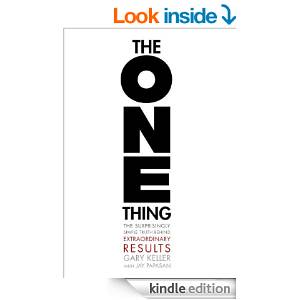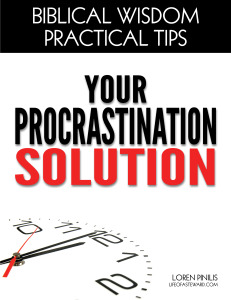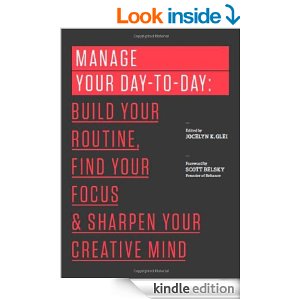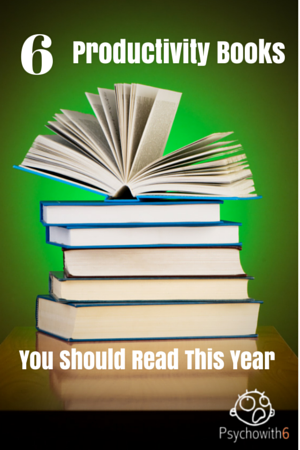
6 Productivity Books You Should Read This Year
 I have read so many productivity and organizing books that I started to think I can’t learn anymore, but boy was I wrong! It isn’t that the concepts are completely new; it’s that the personal insights and presentation are. I had a hard time limiting myself to six, but here are some great productivity books for you to read this year and why I’m crazy about them.
I have read so many productivity and organizing books that I started to think I can’t learn anymore, but boy was I wrong! It isn’t that the concepts are completely new; it’s that the personal insights and presentation are. I had a hard time limiting myself to six, but here are some great productivity books for you to read this year and why I’m crazy about them.
#1 Perfect Time-Based Productivity by Francis Wade
I was very surprised that this book, which helps you evaluate your productivity habits regardless of your approach, was so enlightening. For example, one habit is collection. This is the idea that you need to collect all of your to-do’s into one trusted system. This is so obvious, but David Allen helped me see that my failure to do this was giving me grief. I’ve been using some kind of task management system for a long time, so I thought I would get high marks in this area. Wrong!
The evaluation in the book helped me see that I was not collecting phone, text, or IM-related tasks. Thus, I was forgetting them! I am now immediately adding them to my system, which at present is ToDoist.
There were other reasons I loved the book, not the least of which is its use of research to support best practices for getting more done. Francis Wade wrote a guest post in which he explains how we can get even more done if we’re already productive.
This is a book you’ll want in your library, regardless of the app or system you’re using at the time.
#2 Organizing Solutions for People with ADHD by Susan Pinsky
I cannot even describe how much I love this book. This book is the natural sequel to FLYLady’s Sink Reflections. I don’t believe I have ADHD, but the author makes it clear that you don’t have to have it to benefit from these organizing principles.
I think I can summarize the premise of the book this way: organize for how you will behave rather than how you’d like to behave. In other words, you may wish you would take the time to put things back into beautiful, stacked Pottery Barn containers, but the truth is you will shove it back into a cabinet, wherever there is room. So make room! Drastically declutter.
I am following the home storage solutions 101 calendar for decluttering this year and I am drastically decluttering. Here’s an example. I have a large number of expensive kitchen appliances that I needed when I was really into healthy eating (why I’m not obsessed with this anymore is a post for another time). While I keep telling myself that I’m going to make homemade jerky and tortillas and bread with wheat flour from my mill, but I don’t. These appliances take up enormous room in my kitchen and mind. Every time I see them, I feel like a failure. No more! They served a purpose at one time in my life and now I’m going to bless someone else with them.
There is more to this book than I can describe here, but I can’t recommend it enough.
#3 The One Thing by Gary Keller
I am easily overwhelmed by all the things I have to or would like to do. Most people have heard of the 80/20 principle (that 80% of the rewards come from 20% of your efforts). Keller makes it that much simpler: choose the one thing that will make everything else easier or eliminated.
I was so enamored with the book that I created a daily, weekly, monthly to-do list for it. I still love it as it gives me clarity and peace of mind.
The One Thing can give you peace of mind, too, no matter how many to-do’s you have on your list.
#4 Essentialism by Greg McKeown
I heard about Essentialism after I read The One Thing. I worried that it would be redundant. It wasn’t.
My biggest takeaway from the book is that I want to BE an essentialist rather than do a few things to simplify my life. I want to replace the nonessentialist thinking of I have to, everything is important, and I can do it all with I choose to, only a few things really matter, and I can do anything, but not everything. The last two are particularly important for me. As hard as it is to admit that I can’t do it all (and that it doesn’t even matter that I can’t), there is great freedom there too.
Essentialism is a book I need to reread regularly. I think you’ll want to be an essentialist, too, if you give it a read.
#5 Your Procrastination Solution by Loren Pinilis
Loren has guest blogged for Psychowith6 on productivity before and I’m a huge fan. He recently completed his ebook which is free to subscribers. I have to tell you that I’ve read a huge number of books on procrastination and I wasn’t expecting much, but this book is really valuable if you are a Christian who struggles with putting things off.
My favorite tip from the book was to visualize yourself in the process of working toward your goal and not just achieving the goal. As I work on my curriculum, I keep fantasizing about the day when the first volume is complete. That’s great! But it makes the day-to-day fanny-in-chair stuff seem that much more unpleasant. Now I visualize myself writing and learning how to complete the project.
That brings me to another insight from the book which was HUGE for me. Loren writes that many people procrastinate because they don’t have a growth mindset, but more of a pass/fail one. In other words, some people put things off when they discover a task doesn’t come easily to them. They assume that they “just aren’t good at it” so there’s no point in continuing. I realized that this is me! I approached my blog that way. When I didn’t have instant success, I thought I wasn’t good at it, and waffled about continuing. Now, of course, I know that like most things, it’s something you can improve on. Most importantly for me, I realized that I had a pass/fail mindset about the curriculum I’m writing. I was wondering if I would be good at it or not. That set me up to procrastinate. Now I’m approaching it as something that will be challenging at first, but that I will grow into.
I believe you’ll gain insights in your procrastination and how to stop, too.
#6 Manage Your Day-to-Day by Jocelyn K. Glei
I listened to this book via Audible when I was on vacation and it was just what I needed. While it is geared toward creatives (and is rated PG for language), I found the admonitions to unplug and give myself time to think incredibly valuable.
The book does offer good ideas for building routines as well. But I do pretty well at that already. What I don’t do as well at is giving myself margin. As a result of reading the book, I plan to take Sundays off and unplug. That may be challenging at first, but I’ll grow into it. It’s not a pass/fail, right?
What productivity books did you read last year that you recommend?
You may enjoy the other 5 Day Hopscotch posts from iHomeschool Network bloggers. Check them out!
read more
